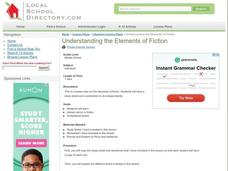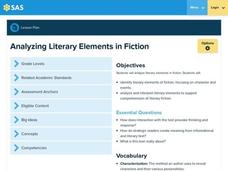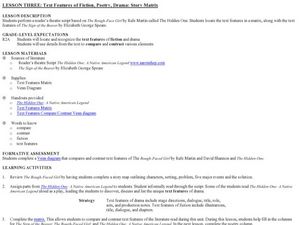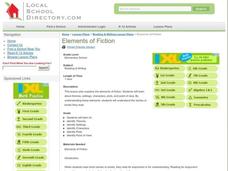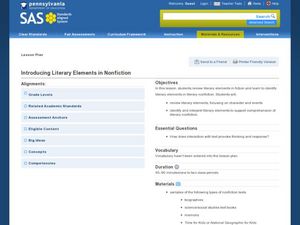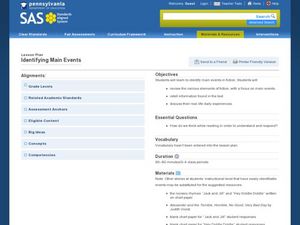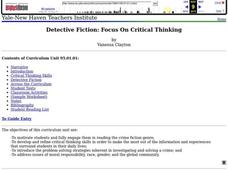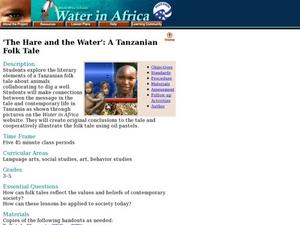Curated OER
Understanding the Elements of Fiction
Inform your class on the elements of fiction: themes, settings, characters, plots, dialogue, narration, flashback, clues, climax, resolution. They write the definitions of the terms on the worksheet provided.l Tip: Have them write a...
Curated OER
Introducing Literary Elements in Fiction
Identify literary elements in fiction. In this reading comprehension lesson, learners read the book Pigsty and record literary elements onto a graphic organizer. They specifically discuss the main characters and events in the text.
Curated OER
Discovering Language Arts-Intermediate Fiction
Explore the elements of science fiction. Students investigate the literary elements present in science fiction and write their own science fiction stories.
EngageNY
Preparing to Write Historical Fiction: Determining Characteristics of the Genre
A language arts instructional activity helps young writers identify elements that make up historical fiction. First, it guides them through elements of fictional pieces with vocabulary cards. Then, pupils work collaboratively to...
Curated OER
Genre Lesson: Realistic Fiction
As scholars begin identifying stories as realistic fiction, its important they see many examples to solidify their concepts of this genre. Readers begin with a personal connection, thinking of television shows they like and determining...
Curated OER
Space and Science Fiction
Use the Franklin Institute's exhibition "An Inquirer's Guide to the Universe" to have students research ideas for a science fiction story. After completing their research, writers will compose science fiction stories that incorporate...
Curated OER
Daughters Come of Age in Women's Fiction
Introduce your young readers to fiction written by women authors. For each story, they explore the way these daughters discover and claim their own identities. Individually, class members use the literature to examine their role in their...
Pennsylvania Department of Education
Analyzing Literary Elements in Fiction
Students analyze the characters and events in fictional writing. In this literary elements lesson, students study the meaning of the words characterization and fiction. They listen to the story Pigsty by Mark Teague, or any other book...
Curated OER
Text Elements of Fiction and Nonfiction
Second graders examine the text elements associated with fiction and nonfiction texts. In this text elements lesson, 2nd graders listen to Anansi and the Moss Covered Rock by Eric A. Kimmel. They take formative assessments to determine...
Curated OER
Text Features of Fiction, Poetry, Drama: Story Matrix
How do novels differ from plays? Explore with your class the text features of fiction and drama by reading The Hidden One: Native American Legend and then performing a reader’s theater script based on the story. Class members create a...
Curated OER
Non-Fiction Text Features
Distinguish between textual features of non-fiction in the book The Lewis and Clark Expedition and in the non-fiction story "Ta-Na-e-Ka." Third graders create posters and participate in group discussions to show their understanding of...
Curated OER
Elements of Fiction
Students identify key story elements in a fiction text. In this literacy lesson, students are introduced to the various elements of fiction such as the setting, plot, and theme. Students read a short story of their choice and identify...
Curated OER
Introducing Literacy Elements in Nonfiction
Explore nonfiction writing with your class. They will identify elements in nonfiction by reviewing elements of fiction. Then they use biographies, memoirs, menus, Time for Kids, and text books to identify elements of nonfiction. They...
Curated OER
Identifying Main Events
Help kindergartners learn to identify the main events in fiction. They will review elements of fiction, retell information found in the text, and discuss their real-life daily experiences. All the while, they will be asking themselves...
Pennsylvania Department of Education
Exploring Key Ideas and Details in Fiction and Nonfiction
Third graders participate in activities to differentiate fiction from nonfiction. In this fiction activity, 3rd graders describe the elements of a fiction story. Students compare and contrast fiction and non fiction elements. Students...
K20 LEARN
Freedom And Restraint: Elements Of Fiction
Kate Chopin's short story, "The Story of an Hour" and John H. Young's "Our Deportment, or the Manners, Conduct, and Dress of Refined Society" offer high school juniors an opportunity to compare the role of women in the 19th century with...
Curated OER
Creating a Science Fiction Story
As the culminating activity in a unit study of science fiction, young writers demonstrate their understanding of the genre by producing their own graphic novel. After deciding on the main elements of their story, individuals use a comic...
Curated OER
Pebbles, Sand and Silt -- Categorizing Fiction and Informational Books
Primary readers complete the activities in a Pebbles, Sand and Silt FOSS kit. As a class, they are given a group of rocks and they are to categorize them based on their activities in the FOSS kit. They use this information and apply it...
Curated OER
Detective Fiction: Focus On Critical Thinking
Turn your 6th graders into detectives while growing their love of reading. Using critical thinking skills, they will be able to describe the five basic elements of detective fiction, read detective novels, make predictions, use the...
National Endowment for the Humanities
Magical Elements in Magical Realism
How does Gabriel Garcia Marquez make the magical elements of his novel appear so real? That's the challenge facing readers of One Hundred Years of Solitude. Scholars examine the tone and descriptive details Garcia Marquez uses to make...
Curated OER
Writing Short Stories: The Fun Way
Do your young authors suffer from writer's block when they try to write short stories? Access their natural creativity with C-Gor, the writing monster! The instructional activity takes aspiring authors through a new writing process...
The New York Times
Writing Fiction Based on Real Science - NYTimes.com
Refuse to alienate your scientific-minded young scholars during your creative writing unit. Learners explore how literary writing can reflect observable fact, and be based in actual science. The links include examples of fiction and...
Curated OER
Identifying Science Fiction
Pupils discuss works of science fiction that they read, highlight aspects that made each a part of science fiction genre, identify formal literary elements, and discuss ways each can be developed through science fiction.
Curated OER
The Hare and the Water: A Tanzanian Folk Tale
"The Hare and the Water," a Tanzanian folk tale, lends a global perspective to literary analysis. Learners spend the first two days reading and storyboarding. On day three, they examine folk tale elements (worksheet included), and design...
Other popular searches
- Literary Elements of Fiction
- Elements of Fiction Books
- 8 Elements of Fiction
- Teaching Elements of Fiction
- The Elements of Fiction
- Elements of Fiction Conflict
- Elements of Fiction Hatchet
- Fiction Story Elements
- Humor Elements of Fiction
- Fiction Elements
- Realistic Fiction Elements
- Historical Fiction Elements


